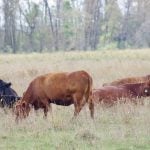WESTLOCK, Alta. – The Western Grain Marketing Panel’s series of meetings on marketing reforms ended with a whimper and a lack of consensus.
About 90 farmers gathered here Jan. 26, about 80 kilometres north of Edmonton, for the last of the panel’s 15 forums across the Prairies.
The low attendance puzzled panelist Owen McAuley, whose 5,000-acre mixed farm straddles the Saskatchewan-Manitoba border.
“Of all the meetings I’ve been to, this has been the most poorly attended,” said McAuley, who participated in all three Manitoba meetings and a forum in Saskatchewan.
Read Also

Canadian farmers need level playing field for regulations – says Minister MacDonald
Federal agriculture minister Heath MacDonald is urging the Canadian Food Inspection Agency and the Pest Management Regulatory Agency to speed up their decision making.
“I’m not sure why. This issue has been at the front burner here more than the other two provinces with the plebiscite (on dual marketing).”
While some organizers suggested frigid temperatures that hovered around -30 C might have contributed to a half-filled hall, one farmer suggested some grain producers might have viewed the meeting with cynicism.
“One guy said lot of people may have written this off as a Canadian Wheat Board meeting,” said Alex Allan, who farms 600 acres near Riviere Qui Barre, just north of Edmonton.
When the crowd broke into small working groups, the meeting highlighted the deep schism of opinion among farmers on the Canadian Wheat Board’s export grain marketing monopoly.
However, even staunch board defenders qualified their support. Many participants wanted the board to become more accountable to grain producers through reforms such as electing board commissioners.
The meeting’s debate surprised panelist Jack Gorr of Three Hills.
After hearing strong support for continuing the board’s monopoly at Kindersley and a powerful push for dual marketing at the Lethbridge and Drumheller hearings, the lack of unanimity in Westlock was refreshing for Gorr.
Allan wasn’t surprised to find Alberta producers differed from their Saskatchewan counterparts.
“I think people in Saskatchewan are comfortable with what happens, with the status quo. They are the main obstacle to changing the Crow Rate,” Allan said.
Change wanted
But the voices at the meeting echoed much of what McAuley heard at hearings in Saskatchewan and Manitoba. The common theme he said, is change.
While the Alberta plebiscite – where almost two-thirds of the province’s barley and wheat producers voted to end the Canadian Wheat Board monopoly – wasn’t mentioned during the formal part of the forum, it loomed over the meeting.
“Farmers in Alberta have already made their wishes known through the plebiscite,” said Stan Wiskel, who farms near Boyle. “They want more accountability, more say in the operations of the wheat board and to get the government out.”
With the town hall meetings concluded, the panel will prepare for public hearings in March. The panel has a June 30 deadline to get its report to Goodale.














